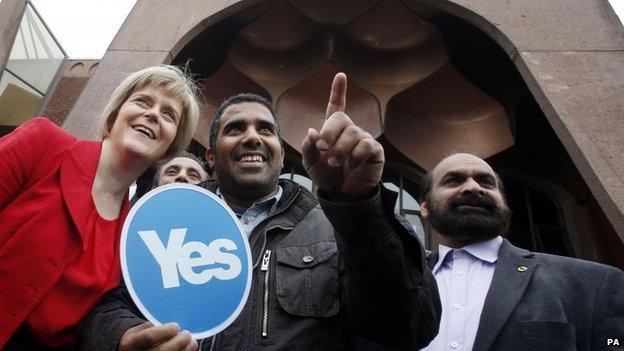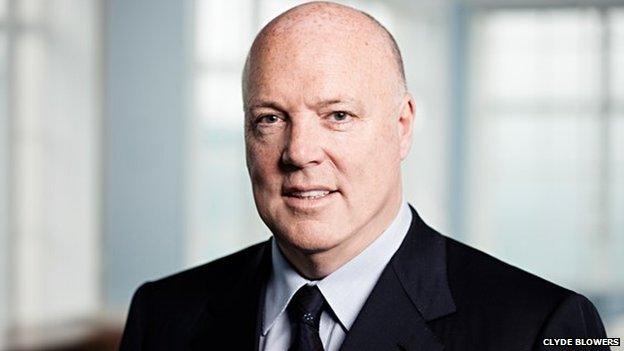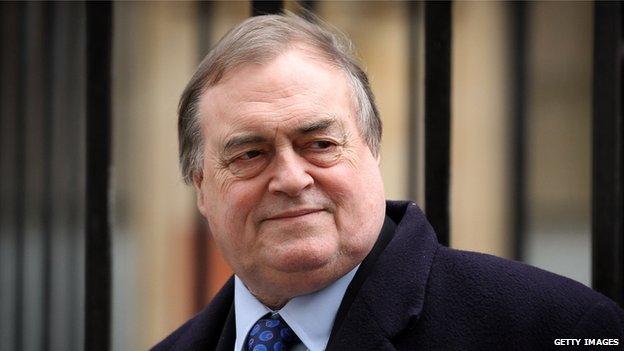Scottish independence: Vote 'will go to the wire'
- Published
- comments
For the first time a mainstream poll has suggested that the Better Together has fallen behind the Yes campaign, as James Cook reports
Campaigners in the battle for Scotland's future say the referendum result is too close to call with less than two weeks until the vote.
The Yes camp claims to have the "big momentum" behind it, while opponents of independence insist they will win.
It comes as one poll put Yes Scotland narrowly ahead for the first time.
Responding to the poll, UK Chancellor George Osborne pledged that in the next few days there would be a plan for more powers for the Scottish Parliament.
Scottish First Minister Alex Salmond branded the suggestion a "panicky" bribe, coming after thousands of people had already voted by postal ballot.
With just 11 days of campaigning left, both sides are stepping up their bids for the wavering voters who could yet sway the result.

VIDEO: Campaigners make pitch to voters
George Osborne said an action plan would provide ''the best of both worlds''
Alex Salmond: ''The whole Westminster elite are losing the referendum campaign''

On 18 September voters will be asked the Yes/No question: "Should Scotland be an independent country?"
The final push for votes comes as a a YouGov poll for the Sunday Times, external suggested that, of those who have made up their mind, 51% planned to back independence, while 49% intended to vote no.
The poll of 1,084 people, carried out between 2 and 5 September, is the first and only serious study to put the Yes campaign ahead.
The cross-party Better Together campaign - which supports the Union - had previously retained a lead in polls, often reaching double digits.
However, a separate poll for the Yes Scotland campaign put the pro-Union camp four points ahead - by 52% to 48% - when undecided voters were excluded.
Pollsters Panelbase questioned voters between 2 and 6 September.
Writing in the Sunday Mirror, external, former Labour Prime Minister Gordon Brown appeared to blame the Conservative Party for the closeness of the battle.
He suggested the Better Together camp was finding it "difficult" to win over Scots because of anger over coalition policies - including changes to housing benefit and tax cuts for the wealthy.


A referendum on whether Scotland should become independent is to take place
People resident in Scotland will be able to take part in the vote, answering the "yes/no" question: "Should Scotland be an independent country?"
The referendum will take place on Thursday, 18 September 2014
Go to the BBC's Scotland Decides page for analysis, background and explainers on the independence debate.

Better Together campaign leader Alistair Darling said the findings were a "wake-up call".
"The polls may conflict," Mr Darling said. "But the message I take from them is clear - if you want Scotland to remain part of the UK family you have to vote for it on 18 September.
"Separation is forever."
And while he insisted "this is a battle we will win", the former chancellor said the result would "go down to the wire".
'Work better'
Commenting on the Sunday Times poll, Deputy First Minister Nicola Sturgeon said: "This breakthrough poll shows that Yes has the big momentum."
"Scotland is one of the wealthiest countries in the world," she added.
"More and more people are beginning to realise that a Yes vote is Scotland's one opportunity to make that enormous wealth work better for everybody who lives here, create more jobs, and protect vital services such as the NHS from the damaging effects of Westminster privatisation."
But the SNP's deputy leader acknowledged the Yes campaign "still has a lot of work to do".

Ms Sturgeon visited Glasgow Central Mosque on the campaign trail on Friday
The Sunday Times poll results exclude undecided voters or those who plan not to vote.
When they are included, 47% backed Yes while 45% said they would opt to stay in the UK.
Responding to the polls, a Downing Street source said David Cameron believed there was "only one poll that matters".
The prime minister would "strain every sinew" to make the case for the union, the source added.
On Sunday's Andrew Marr Show, George Osborne promised further powers to Scotland if there is a No vote.
He said: "You will see in the next few days a plan of action to give more powers to Scotland, more tax powers, more spending powers, more powers over the welfare state.
"That will be put into effect the moment there is a 'No' vote in the referendum."
However, speaking on the BBC's Sunday Politics Scotland, Mr Salmond called the new proposal a "bribe".
He said: "Are we expected to believe, after hundreds of thousands have already voted, that there's a radical new deal?
"This is a panicky measure made because the 'Yes' side is winning on the ground."
He added: "They're trying to bribe us, but it won't work as they have no credibility left."

Analysis
John Curtice, professor of politics at Strathclyde University
At first glance today's two referendum polls tell much the same story. One, YouGov, says that the Yes side is narrowly ahead, while the other, Panelbase, says it is only just behind. Both polls are thus effectively saying that the referendum now looks too close to call.
But look a little closer and we see a remarkable difference between the two polls. Four weeks ago, YouGov were reporting the No side were 22 points ahead. But since then three polls in succession have identified a continuing trend to Yes that cumulatively amounts to no less a 12 point swing.
In contrast, Panelbase, always hitherto the most optimistic pollster for the Yes side, first put Yes on 48% as long ago as June. It did the same just three weeks ago. In other words its poll has failed to detect any recent swing to the Yes side at all.
Given this contrast, until another pollster confirms that there has indeed been a substantial swing to Yes there will inevitably be some doubt about just how much the progress the Yes side has made.
That said, a majority of pollsters have said in their most recent poll that the Yes vote is now at least as high as it has been at any point during the campaign. The race certainly now looks tight - we are just as yet still not sure quite how tight.

Elsewhere, Labour leader Ed Miliband suggested in an interview with the Scottish Mail on Sunday, external that manned border guards could be introduced if Scotland voted to go independent.
He told the paper: "If you don't want borders, vote to stay in the United Kingdom."
A spokesman for Mr Miliband added: "The last time I looked there were two sides to the border - and we would be in charge of one of them. It would be up to us, not [First Minister Alex] Salmond, to secure our northern border."
The party later said on Twitter that there was "no Labour 'plan' for border guards in [an] independent Scotland".

Pro-independence tycoon Jim McColl will write a letter targeting undecided voters
The two sides will intensify their efforts this week, with senior Labour Party figures including John Prescott and Welsh first minister Carwyn Jones due to appear for Better Together.
For the pro-independence camp, a Yes Scotland television advert focusing on the NHS will be broadcast on Monday, and on Tuesday Mr Salmond will answer questions from undecided voters on Facebook.
The Yes campaign also plans to send out 675,000 letters from engineering tycoon Jim McColl, who recently stepped in to save Ferguson Shipbuilders on the Clyde, urging undecided voters to support independence.
Mr Darling described the planned letter as "rank hypocrisy", arguing that Mr McColl was not based in Scotland.
He also criticised the nationalists over a Commons vote on controversial welfare reforms on Friday, from which four out of six SNP MPs were absent.

Labour's John Prescott and Welsh first minister Carwyn Jones will campaign for a "No" vote
Better Together will also step up its leafleting and young voters will receive personally addressed letters.
Labour MP Douglas Alexander said: "In the course of the coming days we will be joined by amongst others John Prescott, the former deputy prime minister, and Carwyn Jones, the first minister of Wales.
"All young voters across Scotland will get a personally addressed letter this week from Better Together.
"Over four million individually addressed pieces of communication started going out last week."